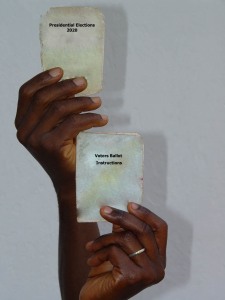
Did you know that as of 2009 Africa has an estimated 987 Million people of which 401 Million are between 0 and 14 years.
Nigeria has the largest population of the African countries with an estimated total population of 149 Million people. The population growth rate is 1.9 %.
This means that in 9 months as many Nigerians will be born as the total population of Namibia, that in 12 months the total populations of Mauritania or Liberia have been reproduced and that in two years the total population of Libya is added to the Nigerian population.
There are 325 Million children ranging from age 4 to 24. These 325 Million children represent the future decision makers of the continent both in private and public sector.
Out of these 325 Million children and youngsters 54 new presidents will come into power every so often in the years to come.
Illiteracy rates are still as high as almost 45% average of the population. Estimates indicate that about 100 Million children drop out of school at some point for various reasons not always because the children want to drop out. Sometimes the eldest son of a family has to take over from a father that turns ill or dies, in order to support the family. Sadly this happens often with children that only have a few years ahead to finish college or high school and as a result all the effort that the family has put in place to get the eldest this far is lost and the chances for the family to finally break out and move up the ladders of society are gone. No social security net is there to protect the hard earned money that was set aside by the family to provide children with education for a better future.
Many people who are involved in development efforts around the world have come to a conclusion that the most important thing is to create jobs. Today nobody would argue in Europe that unemployment is one of the biggest threats to its economy. Spain with unemployment rates reaching 20% is currently looked upon as the biggest burden of the EU.
Most countries in the developing world would love to reach unemployment rates of “only 20%”.
Junior Achievement (JA) is an organization that support almost 10 million children around the world with education programs that teach them entrepreneurship and financial literacy. One of the most successful programs is The company program that teaches students how to set up a company, find investors, decide on product and marketing strategies, organizational set-up etc. Students that attend this program have demonstrated higher success rates when starting up a company and therefore JA is very hopeful that through this program many out-of-school youth will get a second chance to find a way to reach economic independence and means to support a family.
In countries where jobs are not available people turn to trade. If this trade is anchored in an enterprise that has been given proper thought, the drive, the passion and the will to succeed of many young Africans will open one way to a successful and sustainable future.
The fiber optic cable connection has been completed in East Africa and therefore accessibility is improving but even though Seacom has agreed with some of the country operators to provide special rates for educational purposes some of the operators prefer to increase their margins then to pass on the lower costs of connectivity to their children. Affordability therefore remains a challenge and despite all efforts that are made to bridge the digital divide it will require in-country decisions to fix this once and for all.
Given that the internet does reach an increasing amount of youngsters (even if slowed down by some of the above described factors) it is only a matter of time before more and more people will demand to be connected, to be given a chance to enjoy good education and to be given a chance to build their future and start sharing the wealth creation.
While good governance is still hard to find in most places in developing nations and often one of the most significant barriers to economic development if not the only one, we don’t have to wait for elections and for new presidents to come to power or start country models from scratch.
Since computers and internet are still luxury for most of the 325 million children in Africa, we need to find clever and creative ways to utilize the existing infrastructures that are there.
Many volunteers are standby waiting for an opportunity to reach out to these children but cannot afford on their own to cater for entire infrastructures.
Many schools do not have the means to pay for a monthly internet bill, since the budgets simply are not there.
The private sector can start today to play a role and to invest in its own future. Infrastructures are not accommodating and most often this is due to a lack of organization and management. Skilled labor is hard to find. So by investing in education companies are investing in their own future employees and in future decision makers that will see the benefits of enabling infrastructures.
Many companies pay for their internet connections on a fixed price basis. Much of this internet power is not used after working hours. This wasted internet power could be put to good use to the likes of JA volunteers who are ready to teach children around the world using video conferencing, instant messenger or other new technologies that today have become the common tools of teenagers that go to schools in the west.
The internet is opening doors to the diaspora to get involved, to train youngsters remotely and to share experiences with those back home, using Skype and other open source technologies that are available to anyone that has access to the internet.
Youngsters in Africa will soon join the development communities using open source technologies for non-mission critical applications and or sell their applications via iTunes to be used by the millions of iPhone users around the world. Made in Africa is just a few internet sessions away.
The same way art of printing books ended the monopoly of the clergy a few centuries ago, the internet will penetrate the developing nations and will break down illiteracy. Once societies will reach critical masses of literacy, people will start asking how come their country is not adopting certain policies that other developing nations have embraced a few decades ago when coming out of independence, like the Asian Tigers, who at the time were economically behind some of the African nations.
Nations will start to demand that current governance models will have to be replaced by more adequate ones and therefore we need to educate the potential voters of to be elected presidents today.
Given that we live in exponential times the good news is that penetration of new technologies is on a bullet train without brakes on its way to the developing world and no governmental stop sign can slow the train down anymore…..
© Desi Lopez Fafié




Hi Fafie,
Great African stories, and YES AFRICA IS THE PLACE TO BE!
In some cases, CEUs take a backseat to professional development in
distance learning. Depending on where you live you can choose to
contact the local or the state one. Dentists Massachusetts undergoes advance
training to learn and master the different aspects of cosmetic dentistry Massachusetts.
Superb blog! Do you have any tips and hints for aspiring writers?
I’m planning to start my own blog soon but I’m a little
lost on everything. Would you recommend starting with a free platform like
Wordpress or go for a paid option? There are so many choices out there that I’m totally confused .. Any tips? Appreciate it!